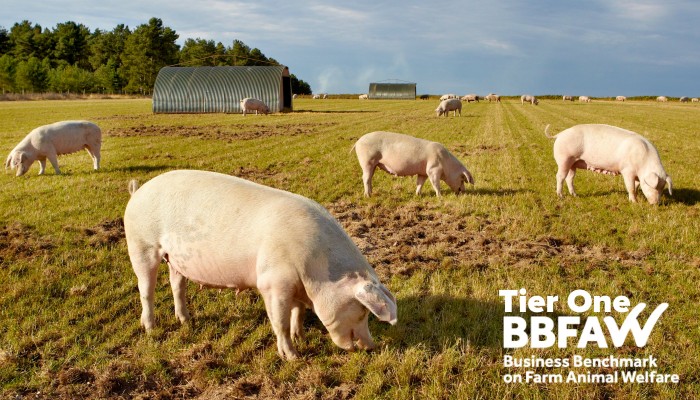Cranswick has once again been awarded the top ranking in the global Business Benchmark on Farm Animal Welfare (BBFAW).
The eighth benchmark, which describes itself as the ‘leading global measure of policy commitment, performance and disclosure on animal welfare in food companies’, was launched today.
UK companies led the way globally and there was a strong UK presence in the top tier, representing ‘global leaders’ in animal welfare, with pork processor Cranswick retaining its position, alongside Noble Foods and retailers Marks & Spencer, Waitrose, Co-op Group (Switzerland) and Migros.
Cranswick and egg producer Noble Foods have performed well over the years both regularly appearing in the top tier,
Cranswick, which produces pigs through Wayland Farms, said it was ‘proud’ to have been awarded the highest performance ranking for the fourth consecutive year, ‘consolidating our leading position in Tier One’.
The 2019 Benchmark, supported by Compassion in World Farming and World Animal Protection, analysed 150 global food companies, placing each in one of six categories.
Tulip’s owners, Brazilian meat giant, JBS is placed in the third tier, representing companies where welfare is ‘established, but there is work to be done’. However, even though it is not officially part of the benchmark, Tulip recently commissioned its own audit, which it said found it ranked in the top tier.
The Co-op, Sainsbury’s, Tesco and Morrisons were all ranked in the second tier (welfare ‘integral to business strategy’), alongside Danish Crown, which moved up one tier, while US retailer and Asda Owner, Walmart, was down in the fourth tier (‘making progress’).
The report shows that the UK continues to lead the global food industry on farm animal welfare management, reporting and performance. UK companies achieved an average score of 64% compared to 40% for companies in Europe (excluding the UK) and 34% for all companies covered by the Benchmark, up from 32% in 2018.
Beyond the individual company rankings, the 2019 Benchmark reported that 60% of the food companies audited now have formal farm animal welfare policies and appropriate management processes for ensuring they are effectively deployed internally and throughout their supply chains.
It cited consumer interest in farm animal welfare, coupled with positive momentum inside a majority of the world’s most influential food companies as key accelerators of year on year change.
However, it warned that progress is still too slow with 40% of the 150 companies still appearing in the bottom tiers, providing little or no information about how they are managing the risks and opportunities associated with farm animal welfare.




